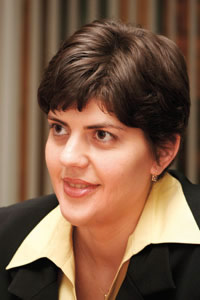Taking centre court
Massive workloads, phantom positions and bad computers – the organisation of prosecutors’ activity is in deadlock, argues new general prosecutor Laura Kovesi, as she talks to Ana-Maria Smadeanu about the road to reform
 The prosecution system in Romania is not perfect.
The prosecution system in Romania is not perfect.
In one court in Brasov, for example, there is a prosecutor who has a backlog of 1,000 cases to work on at once. While there is another in the Court of Appeal, who has only three cases on his books.
“There is a very big discrepancy,” says the newly appointed general prosecutor Laura Kovesi, who must administrate the Public Ministry, which coordinates Romania’s prosecutors. “Imagine a prosecutor who has 1,000 cases. What kind of quality of work can he do? How can he work on 1,000 at the same time?”
Busted old computers, people working in positions where they do nothing, cases that drag on for years, all these procedural matters are clogging up the workload of justice – before it can even begin to prosecute and defend.
“I want to see this body as an efficient structure, credible, prompt and transparent,” says Kovesi. “The Public Ministry is in deadlock now.”
33-year old former basketball player Kovesi has worked for 11 years as a prosecutor and never belonged to a political party. “I am totally apolitical,” she says.
|
Covasna county-born, she believes her appointment, at the suggestion of that other apolitical figure in justice, Minister Monica Macovei, was due to her age and experience – where she became a leading prosecutor in organised crime and terrorism in Sibiu. She replaces Ilie Botos, who resigned last summer after Omar Hayssam, wanted in connection with kidnapping journalists in Iraq, escaped the country.
“Youth is an advantage because young people adjust quickly to changes and modifications and take on responsibilities faster,” says Kovesi. “When you are young, you are more active and, in my position, you have to be active, to know the problems of the system and to have the power to reform the whole body.”
Once Romania joins the EU, the country’s borders will be open and will allow criminal groups to move from one country with less monitoring.
“The problems of organised crimes are many,” says Kovesi. “Now Romania is a country of transit [for example] of drugs traffic. There are problems with human trafficking as well. Certainly we won’t succeed to eradicate them, but we can fight against them.”
The priority for Kovesi is to propose a law changing the focus of DIICOT [Department of Investigating Organised Crimes and Terrorism] to deal only with large cases concerning criminal networks, not minor issues.
“We hope to create the financial support to help the prosecutors do their job,” says Kovesi.
Also she aims to specialise prosecutors in different fields, such as economics, borders, domestic violence or children.
The main problems of the ministry, she says, include assessing the quality of the staff. This, she argues, is the Superior Council of Magistrates (CSM)’s responsibility. “It is very hard to have an efficient management if you can’t hire people, you cannot evaluate, transfer and punish them,” she explains. “We have to find solutions and present them to the CSM.”
Kovesi says the Supreme Court has a too complex organisation with too many management positions and some departments which do not function. The new general prosecutor wants to eliminate these ‘ghost’ posts. Now there are around 2,600 positions in the Public Ministry, but only 2,073 are occupied. There is a deficit of 500. Kovesi not only intends to cut the number of positions and reorient people to where more activity is needed.
She also wants to change the equipment in the Public Ministry.
“For years we fought for salaries and I think it is time to fight for some other things, such as new offices facilities, cars and new computer systems,” Kovesi argues. “Our staff is working using archaic methods and new computer systems will help us have operational control and take quicker decisions.”
One of the strongest criticisms levelled at Romania’s justice system is that no big fish of corruption have been caught.
“Lately even they have been sent to court,” says Kovesi. “There were prosecutors, judges, state secretaries and deputy premiers who were charged. But the Public Ministry’s intervention stops when we indict the accused and send them to court.”
But she argues that recently the Prosecutor’s Office has proved its efficiency.
“Cases of corrupt judges and prosecutors are in the spotlight,” she says.
